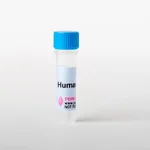
Thermo Fisher Scientific CD3 Monoclonal Antibody (eBioG4.18 (G4.18)), FITC, eBioscience
✨AI 추천 연관 상품
AI가 분석한 이 상품과 연관된 추천 상품들을 확인해보세요
연관 상품을 찾고 있습니다...
Applications
Tested Dilution
Publications
Immunohistochemistry (IHC)
-
View 1 publication 1 publication
Flow Cytometry (Flow)
0.5 µg/test
View 13 publications 13 publications
Product Specifications
Species Reactivity
Rat
Published species
Rat
Host/Isotype
Mouse / IgG3, kappa
Recommended Isotype Control
Mouse IgG3 Isotype Control (B10), FITC, eBioscience™
Class
Monoclonal
Type
Antibody
Clone
eBioG4.18 (G4.18)
Conjugate
FITC FITC FITC
View additional formats
Excitation/Emission Max
498/517 nm View spectra 
Form
Liquid
Concentration
0.5 mg/mL
Purification
Affinity chromatography
Storage buffer
PBS, pH 7.2
Contains
0.09% sodium azide
Storage conditions
4° C, store in dark, DO NOT FREEZE!
Shipping conditions
Ambient (domestic); Wet ice (international)
RRID
AB_464877
Product Specific Information
Description: The eBioG4.18 monoclonal antibody recognizes the rat CD3 protein. CD3 is a critical component of the T-cell receptor (TCR) and is a marker of the T-cell lineage. CD3 is a complex of several subunits and, upon binding of a TCR ligand, participates in transduction of signals from the TCR to the nucleus which results in a variety of cellular responses including transcription of IL-2 and clonal expansion. in vitro, immobilized G4.18 monoclonal antibody has been demonstrated to activate T cells, while soluble G4.18 inhibited allogeneic mixed-lymphocyte proliferative responses and cell-mediated cytotoxicity to allogeneic target cells. in vivo, G4.18 was demonstrated to induce long-term specific tolerance to an organ allograft.
Applications Reported: This eBioG4.18 (G4.18) antibody has been reported for use in flow cytometric analysis.
Applications Tested: This eBioG4.18 (G4.18) antibody has been tested by flow cytometric analysis of rat splenocytes. This can be used at less than or equal to 0.5 µg per test. A test is defined as the amount (µg) of antibody that will stain a cell sample in a final volume of 100 µL. Cell number should be determined empirically but can range from 10^5 to 10^8 cells/test. It is recommended that the antibody be carefully titrated for optimal performance in the assay of interest.
Excitation: 488 nm; Emission: 520 nm; Laser: Blue Laser.
Filtration: 0.2 µm post-manufacturing filtered.
Target Information
The CD3 subunit complex which is crucial in transducing antigen-recognition signals into the cytoplasm of T cells and in regulating the cell surface expression of the TCR complex. T cell activation through the antigen receptor (TCR) involves the cytoplasmic tails of the CD3 subunits CD3 gamma, CD3 delta, CD3 epsilon and CD3 zeta. These CD3 subunits are structurally related members of the immunoglobulins super family encoded by closely linked genes on human chromosome 11. The CD3 components have long cytoplasmic tails that associate with cytoplasmic signal transduction molecules and this association is mediated at least in part by a double tyrosine-based motif present in a single copy in the CD3 subunits. CD3 may play a role in TCR-induced growth arrest, cell survival and proliferation. The CD3 antigen is present on 68-82% of normal peripheral blood lymphocytes, 65-85% of thymocytes and Purkinje cells in the cerebellum. It is never expressed on B or NK cells. Decreased percentages of T lymphocytes may be observed in some autoimmune diseases. The genes encoding the CD3 epsilon, gamma and delta polypeptides are located on chromosome 11. Defects in the CD3 gene are associated with CD3 immunodeficiency.
For Research Use Only. Not for use in diagnostic procedures. Not for resale without express authorization.
🏷️Thermo Fisher Scientific 상품 둘러보기
동일 브랜드의 다른 상품들을 확인해보세요

Thermo Fisher Scientific
Thermo Fisher Scientific CD3 Monoclonal Antibody (OKT3), FITC, eBioscience
144,700원

Thermo Fisher Scientific
Thermo Fisher Scientific Human Sox2 Recombinant Protein, PeproTech
139,800원

Thermo Fisher Scientific
Thermo Fisher Scientific CD3 Monoclonal Antibody (eBioG4.18 (G4.18)), FITC, eBioscience
131,000원

Thermo Fisher Scientific
Thermo Fisher Scientific CD3 Monoclonal Antibody (SK7), FITC, eBioscience
161,300원

Thermo Fisher Scientific
Thermo Fisher Scientific Human p16-INK4a-TAT Recombinant Protein, PeproTech
139,800원
배송/결제/교환/반품 안내
배송 정보
| 기본 배송비 |
| 교환/반품 배송비 |
|
|---|---|---|---|
| 착불 배송비 |
| ||
| 교환/반품 배송비 |
| ||
결제 및 환불 안내
| 결제수단 |
|
|---|---|
| 취소 |
|
| 반품 |
|
| 환급 |
|
교환 및 반품 접수
| 교환 및 반품 접수 기한 |
|
|---|---|
| 교환 및 반품 접수가 가능한 경우 |
|
| 교환 및 반품 접수가 불가능한 경우 |
|
교환 및 반품 신청
| 교환 절차 |
|
|---|---|
| 반품 절차 |
|
